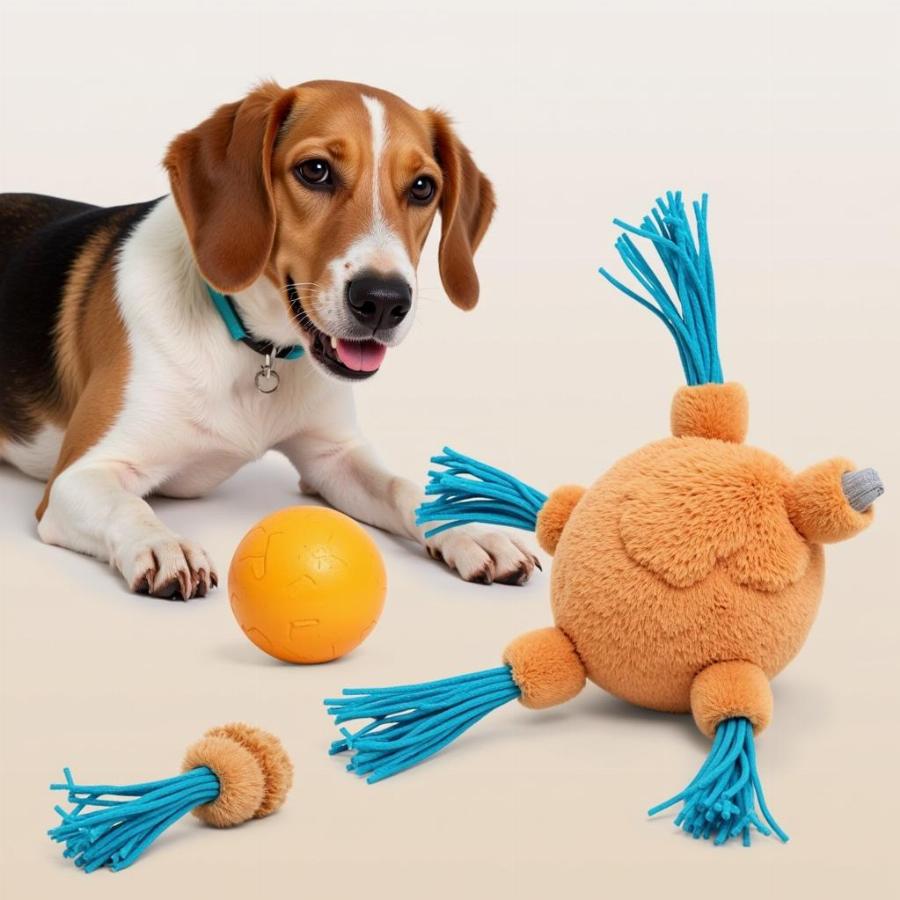Understanding why your dog nibbles on blankets can be puzzling. Is it boredom? Anxiety? Or something else entirely? This behavior, while seemingly harmless, can actually stem from a variety of reasons, from simple comfort-seeking to more complex emotional needs. In this article, we will delve into the common causes behind blanket nibbling in dogs, helping you decipher your furry friend’s actions and providing solutions to redirect this behavior if necessary.
Unraveling the Mystery of Blanket Nibbling
Many dog owners observe their canine companions gently gnawing or sucking on blankets. This can range from a light nibbling to more intense sucking and chewing. While it might appear unusual, blanket nibbling is often a normal, even instinctual behavior, especially in puppies. However, it can sometimes signal underlying issues that require attention. Let’s explore the potential reasons behind this quirky habit.
Comfort and Security: A Blanket as a Surrogate
For many dogs, a blanket offers comfort and security, much like a child’s beloved stuffed animal. The soft texture and familiar scent can be incredibly soothing, especially in stressful situations like thunderstorms or being left alone. This is particularly true for puppies who have recently been separated from their mothers and littermates. The blanket can act as a surrogate, providing a sense of warmth and security that reminds them of their early days.
Teething Troubles: A Soothing Solution
Puppies, just like human babies, experience the discomfort of teething. Nibbling on a blanket can help alleviate this pain by providing a gentle counter-pressure on their sore gums. The texture of the blanket can also be stimulating for their developing jaws. If your puppy is teething, providing safe and durable chew toys can help satisfy their need to gnaw and protect your blankets from excessive wear and tear.
Boredom and Anxiety: Seeking Stimulation
Sometimes, blanket nibbling can be a sign of boredom or anxiety. A dog left alone for long periods with little stimulation might resort to nibbling on blankets as a way to occupy themselves. Similarly, anxious dogs might find comfort in the repetitive action of nibbling, which can release endorphins and have a calming effect. why does dog nibble on blankets Providing plenty of physical exercise, mental stimulation, and interactive toys can help alleviate boredom and reduce anxiety-related nibbling. why do dogs nibble Consider puzzle toys, interactive games, and regular walks to keep your dog engaged and entertained.
Medical Reasons: Ruling Out Underlying Issues
While less common, blanket nibbling could occasionally be related to underlying medical conditions, such as gastrointestinal issues or nutritional deficiencies. If your dog’s blanket nibbling is accompanied by other symptoms like vomiting, diarrhea, or changes in appetite, it’s crucial to consult a veterinarian to rule out any potential medical concerns.
 Chó chơi đồ chơi
Chó chơi đồ chơi
When to Intervene: Addressing Excessive Nibbling
While occasional blanket nibbling is generally harmless, excessive chewing or destruction of blankets can become problematic. blanket with dogs on it If your dog is shredding blankets and ingesting the fabric, it could lead to digestive issues or blockages. In such cases, it’s essential to address the behavior and redirect it to more appropriate outlets. Offering a variety of safe and engaging chew toys can help satisfy your dog’s need to gnaw. beds that dogs can't chew You can also try providing alternative comfort items, such as a plush toy or a durable dog bed. dog sucking blanket
Expert Insights: Understanding Canine Behavior
Dr. Emily Carter, DVM, a renowned veterinary behaviorist, explains, “Blanket nibbling can be a perfectly normal behavior, stemming from a dog’s natural instincts for comfort and security. However, it’s crucial to differentiate between normal nibbling and destructive chewing. If your dog is excessively destroying blankets, it might signal an underlying anxiety issue or a lack of appropriate stimulation.”
Conclusion: Decoding Your Dog’s Blanket Nibbling
Understanding why your dog nibbles on blankets requires careful observation and consideration of their overall behavior and environment. By addressing the root cause, whether it’s comfort-seeking, teething, boredom, or anxiety, you can ensure your furry friend’s well-being and protect your blankets from becoming shredded remnants. Remember, a little detective work can go a long way in understanding your dog’s unique needs and behaviors.
FAQ: Common Questions About Blanket Nibbling
- Is blanket nibbling harmful to my dog? Occasional nibbling is usually harmless. However, excessive chewing and ingestion of fabric can be dangerous.
- How can I stop my dog from nibbling on blankets? Provide alternative chew toys, increase exercise and mental stimulation, and address any underlying anxiety.
- Is it normal for adult dogs to nibble on blankets? Yes, it can be. It often provides comfort and security.
- Could my dog’s blanket nibbling be a sign of a medical problem? While less common, it could be. Consult your veterinarian if you notice other symptoms like vomiting or diarrhea.
- What kind of chew toys are best for dogs who nibble on blankets? Durable rubber toys, rope toys, and plush toys designed for chewing are good options.